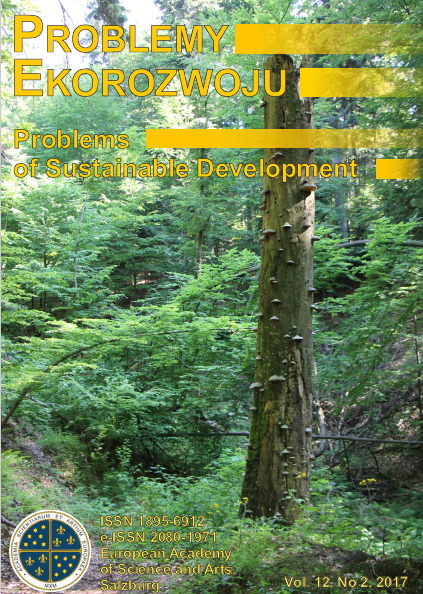Troublesome Evaluation of Technological Innovations. Balancing Between a Blessing and a Bane of the Technological Progress
Article Sidebar
Issue Vol. 12 No. 2 (2017)
-
Troublesome Evaluation of Technological Innovations. Balancing Between a Blessing and a Bane of the Technological Progress
Wiesław Sztumski7-13
-
Multi-criteria Evaluation of the Eco-innovation Level in the European Union Countries
Andrzej Kobryń, Joanna Prystrom15-26
-
Decomposition Analysis of the Greenhouse Gas Emissions in the European Union
Magdaléna Drastichová27-35
-
Call for Integral Protection of Biocultural Diversity
Ryszard F. Sadowski37-45
-
Modern Issues of Development of the System of Specially Protected Natural Areas in the Context of the Concept of Sustainable Development
Aleksey Anisimov, Kermen Lidzheeva, Anatoliy Ryzhenkov47-57
-
Sustainability, Corporate Community Engagement and Enterprise Development – Lessons from a Case Study in Emu-Ebendo Niger-Delta, Nigeria
O.E. Ajide, P.A. Strachan, A. Russell, D.R. Jones59-68
-
Corporate Environmental Responsibility for a Sustainable Future
Pankojini Mulia, Ajit Kumar Behura, Sarita Kar69-77
-
Environmental Impact of Application on the Concept of Corporate Social Responsibility in Selected EU Countries
Jana Hroncová Vicianová, Štefan Hronec79-88
-
Wellbeing versus Sustainable Development – Conceptual Framework and Application Challenges
Anna Dłużewska89-97
-
Understanding Farmers’ Adoption Decisions for New Cash Crops: Evidence from Xishuangbanna in Tropical China
Le Zhang, Yasuyuki Kono, Xiaobo Hua, Lin Zheng, Rui Zhou99-108
-
Development Aid as a Gift of Love: Re-inventing Aid on a Spiritual Foundation
Rohana Ulluwishewa109-118
-
Where Science Fails, Outdated Religion Provides Clues
Venkatesh G.119-122
-
The Shaping of Sustainable Landscape in the Context of the European Landscape Convention and the Encyclical Laudato Si’
Sebastian Bernat, Małgorzata Flaga, Wioletta Kałamucka123-131
-
Sustainable Development in the Russian Federation – Indicator-based Approach
Bartosz Bartniczak, Andrzej Raszkowski133-142
-
Twenty-five Years of Independent Ukraine: Is there a Way to Sustainable Healthy Development?
Viktoriya Pantyley, Roman Lozynskyy, Roman Slyvka143-160
-
Youth Attitudes Towards Goals of a New Sustainable Development Agenda
Tatjana Borojević, Matjaž Maletič, Nataša Petrović, Jelena Andreja Radaković, Marjan Senegačnik, Damjan Maletič161-172
-
Utilitarian Technological Solutions to Reduce CO2 Emission in the Aspect of Sustainable Development
Tomasz P. Olejnik, Elżbieta Sobiecka173-179
-
Environmental Risks Related to the Recovery and Recycling Processes of Waste Electrical and Electronic Equipment (WEEE)
Agnieszka Generowicz, Ryszarda Iwanejko181-192
Archives
-
Vol. 14 No. 2
2019-07-01 20
-
Vol. 14 No. 1
2019-01-02 20
-
Vol. 13 No. 2
2023-10-15 22
-
Vol. 13 No. 1
2018-01-02 23
-
Vol. 12 No. 2
2017-07-03 18
-
Vol. 12 No. 1
2017-01-02 16
-
Vol. 11 No. 2
2016-07-01 17
-
Vol. 11 No. 1
2016-01-04 20
-
Vol. 10 No. 2
2015-07-01 17
-
Vol. 10 No. 1
2015-01-05 16
Main Article Content
Authors
Abstract
Technological innovations are the driving force of the technological progress. They must be multiplied and accelerated so that people could live, the humanity be preserved, to survive in a world full of threats, to develop people, to improve the standards of living and to satisfy ever growing needs. For this reason, we assess them favorably. On the other hand, however, there are certain disadvantages because they generate different and serious threats to people and the natural and social environments. This includes nuclear, chemical, biological, psychological and information weapons, as well as robotics, use of pesticides, genetic engineering, and interference of techniques in the consciousness and the sub-consciousness of men. Certain threats manifest immediately and others – after a long time, like ticking time bombs. Therefore, the evaluation of innovation is very troublesome. It is also problematic and ambivalent because of the huge diversity of people who make the assessment.
Keywords:
References
BLOCH E., 1954, Das Prinzip der Hoffnung, Suhrkamp, Berlin.
DOMINICZAK M., 2017, Księga mądrości, http://booklikes.com/ksiega-madrosci-maciej-dominiczak/book (11.01.2017).
HUBBARD E., HUBBARD B., 1946, The Philosophy of Elbert Hubbard, H. Wise & Co., New York.
LADOU J. et al., 2010, The Case of Global Ban on Asbestos, in: Environmental Health Perspectives July.
NOWACKI W., 1983, Civilization and Logic: the Law of Inversely Proportional Stupidity, Forest Hills, NOW Mail Order Books, New York.
POSTREL V., 1998, The Future and Its Enemies: The Growing Conflict Over Creativity, Enterprise and Progress, Free Press, New York.
STEELE B., 2005, Researchers build a robot that can reproduce, in: Cornell Chronicle, May.
SZTUMSKI W., 2011, Jeszcze jeden kodeks etyczny? Rzecz o kulturze zakazów, in: Sprawy Nauki No 11.
SZTUMSKI W., 2009, The Mythology of Sustainable Development, in: Problemy Ekorozwoju/ Problems of Sustainable Development, vol. 4, no 2.
UNGER S.H., 2014, Is Progress in Technology Always Beneficial?, http://www.opednews.com (11.01.2017).
WILSON B., 2008, Traffic Accidents Top Cause Of Fatal Child Injuries, in: NPR Science 10.12.2008.
YOUNKINS E., 2010, Technology, Progress, and Freedom, in: Foundation for Economic Education, January.
ZAMYSLENIE.PL, 2017, Komputery nie mają duszy, w rękach ludzi bezdusznych mogą być niebezpieczne, htps://www.zamyslenie.pl/aforyzm/komputery-nie-maja-duszy-w-rekach-ludzi-bezdusznych-moga-byc-niebezpieczne-3235274 (14.02.2017).
Article Details
Abstract views: 86
License

This work is licensed under a Creative Commons Attribution-ShareAlike 4.0 International License.


